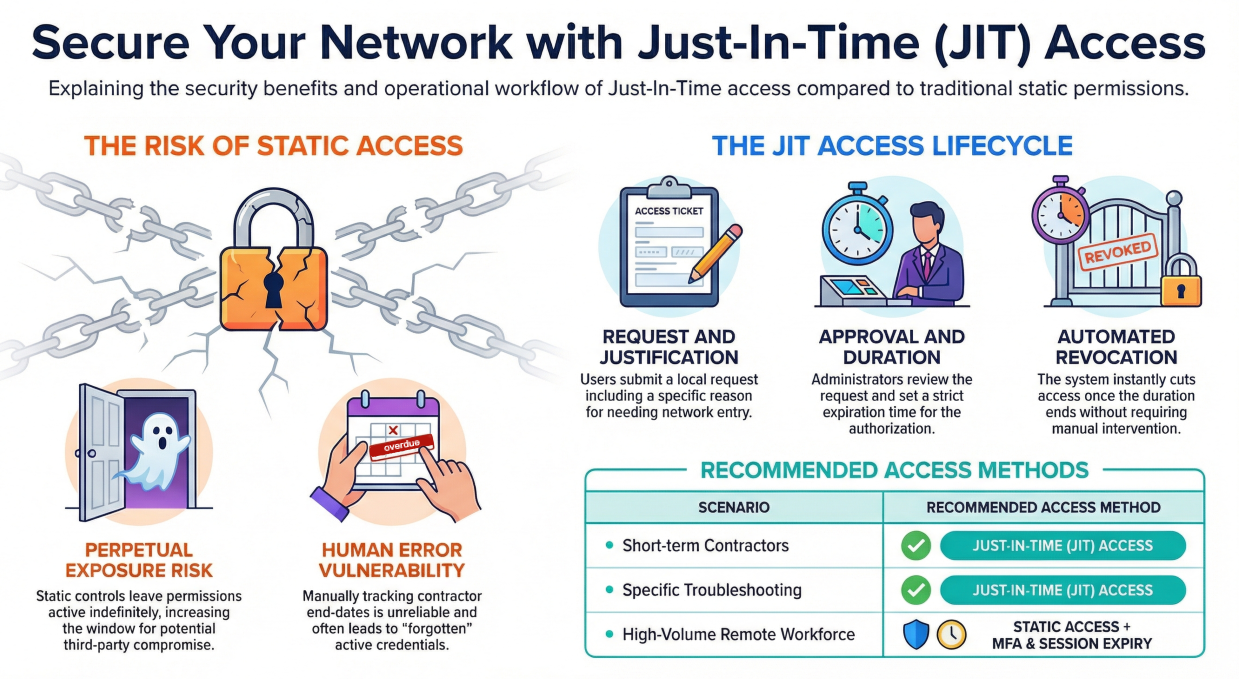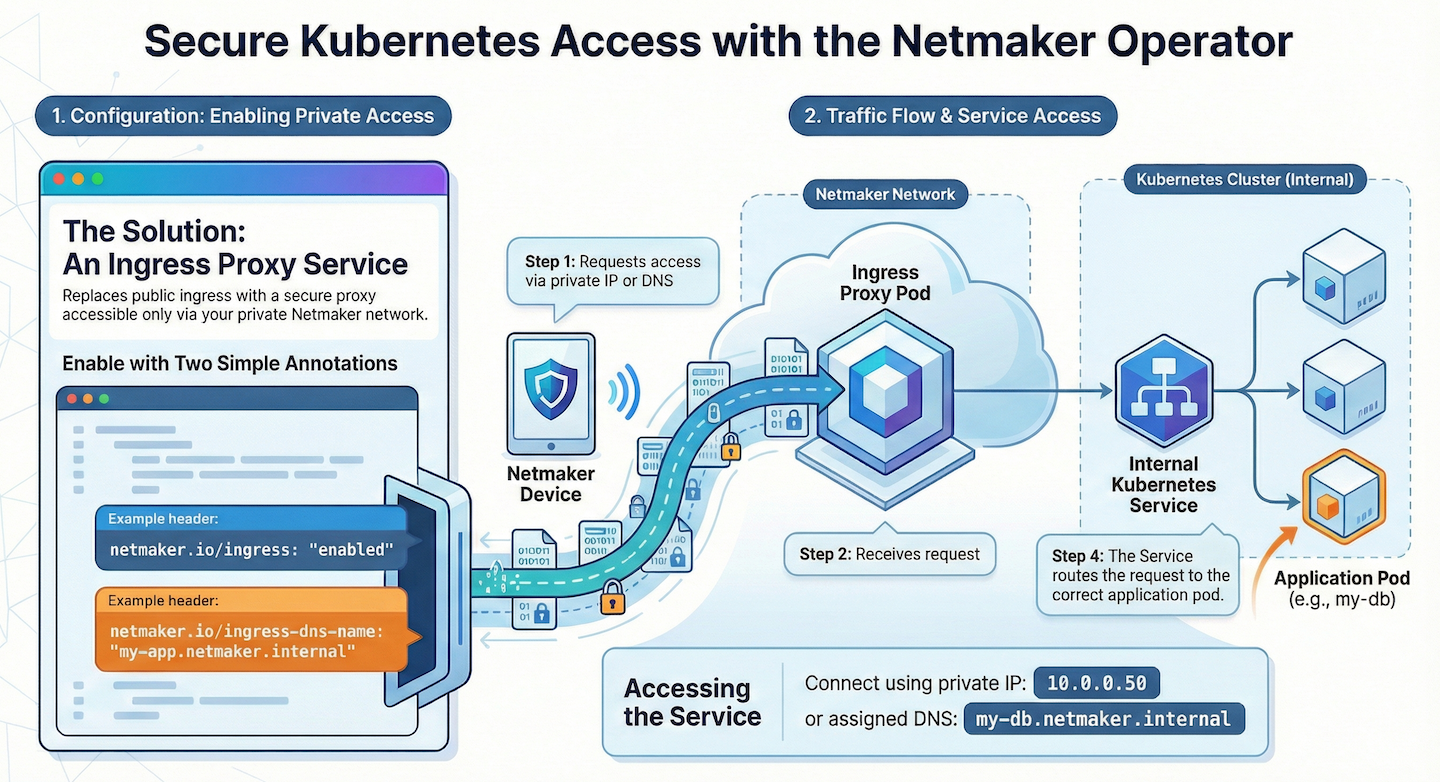Components & Features of an Enterprise VPN

An enterprise VPN is a virtual private network that's built specifically for businesses. Unlike consumer VPNs, which you might use at home to watch Netflix from another country, enterprise VPNs are far more robust. They focus on securing the network and data for an entire company.
An enterprise VPN acts as a secure tunnel through which all your company's data travels. This tunnel is encrypted, which means that any data passing through it is scrambled and can only be read by someone who has the decryption key.
Managing an enterprise VPN also involves a lot of configuration and oversight. IT departments typically set up and control access policies, ensuring that only authorized employees can use the VPN. They might use tools like multi-factor authentication (MFA) to add an extra layer of security.
What is the difference between a personal VPN and an enterprise VPN?
The most obvious difference between personal and enterprise VPNs is the number of users. Normally, personal VPNs only accommodate one user across multiple devices. Meanwhile, enterprise VPNs support multiple users within a company.
If you're looking for a VPN that can accommodate your remote business, you should go for an enterprise VPN. It will allow your employees to download the VPN application onto their devices and use it to connect securely to the company's network.
Another feature unique to enterprise VPNs is account management. It restricts other users from intentionally or accidentally meddling with the VPN settings. Only an account manager has full control over the configuration.
For example, they can add or remove users and devices, connect company servers to the network so users have access from anywhere, change global settings for the entire company, dictate which servers and web applications users can access, and monitor users’ activities from a centralized panel.
With personal VPNs, the individual user has complete control over their account, which is used primarily for accessing public internet sites like Netflix or Google.
When it comes to servers and IP addresses, personal VPNs are geared towards anonymous browsing or hiding internet activity. Multiple servers in various countries are provided to randomize users' internet activities. This can lead to server overload and slower connection speeds when too many users are on the same server at the same time.
Additionally, you will be randomly assigned an IP address, which can change every time you connect. You will also be sharing your IP address with other users. On the other hand, enterprise VPNs can provide you with a dedicated IP address and a private server.
Each connected device gets a static IP address, and the public internet IP address will be shared among users within the company. This ensures better performance and connections, along with top-notch security to prevent server breaches.
Components of an enterprise VPN
VPN client software
This is what your employees install on their devices. Whether they're using a laptop, tablet, or smartphone, this software allows them to connect to your enterprise VPN securely.
For instance, when your sales team members are working from cafes or airports, they use the VPN client software to ensure their connection is just as secure as if they were sitting at their desks in the office.
VPN server
This server is like the gatekeeper that authenticates and authorizes users trying to access the company network. It ensures that only employees with the right credentials can get in.
The VPN server is like the security desk in your corporate headquarters. If Sarah from marketing logs in from her home office, the VPN server checks her credentials before letting her through the virtual doors.
Firewalls and antivirus solutions
Integrating these components with your VPN solution ensures that when devices connect to the VPN, they are not bringing in any malware or unauthorized traffic. Even when David from finance connects from a hotel Wi-Fi, the firewall ensures that only safe and necessary data gets through.
Dedicated IP addresses and private servers
Unlike personal VPNs that randomize IP addresses, your enterprise VPN can offer a static IP address for each connected device. This makes it easier to manage network traffic and enhance security.
For instance, your development team in another city can consistently access your server elsewhere in the country without worrying about IP changes, leading to smoother operations.
Key features of an enterprise VPN
Multi-Factor Authentication (MFA)
In today's world, relying solely on passwords is just not enough. Hackers have become adept at cracking even the most complex passwords. MFA adds an extra layer of security by requiring additional forms of verification beyond just the password.
With MFA in place, after entering passwords, users are prompted to provide a second form of verification. This could be a code sent to his phone or generated by an authentication app like Google Authenticator.
Even if someone managed to steal a password, they would still need access to the owner’s phone to complete the login process. This dual-check system effectively keeps unauthorized users out.
Implementing MFA is straightforward. Your IT department can easily set it up and manage it through centralized management tools. They can enforce MFA for all employees, ensuring no one can bypass this crucial security measure.
MFA is highly desired for its versatility. You can choose different types of secondary verification methods based on what works best for your team. Some use text messages, others use email, and a few prefer authentication apps. This flexibility makes it convenient for everyone while maintaining a high-security standard.
In essence, MFA isn't just an added security layer; it's a necessity. It gives you peace of mind knowing that your company's sensitive information is protected by more than just passwords. Whether it's preventing unauthorized access or securing remote connections, MFA plays a pivotal role in your overall enterprise VPN strategy.
Centralized management
Centralizing management lets users oversee the entire VPN setup from a single dashboard. This makes life easier for your IT team, who, among other tasks, can quickly add or remove users without jumping through multiple systems. This efficiency is crucial when onboarding new employees or dealing with departures.
Centralizing VPN management also lets you enforce security policies uniformly across the network. If you need to implement a new policy, like requiring all employees to use multi-factor authentication (MFA), you can roll it out with a few clicks. This ensures that no one slips through the cracks.
Another advantage of a dashboard that centralizes VPN management is real-time monitoring. Your IT team can see who is connected to the VPN and from where. This helps you identify any unusual activity quickly.
For example, if a team member from marketing suddenly logs in from a different country, your IT team can verify if it's a legitimate business trip or a potential security breach. This proactive approach keeps our network secure and our data safe.
The centralized management system also integrates with other security measures like firewalls and antivirus software. This integration ensures that devices connecting to the VPN are compliant with our security standards.
Even when David from finance connects from a hotel Wi-Fi, the system checks his device for compliance, preventing any potential threats from entering our network.
The benefits of centralized management for an enterprise VPN extend beyond security. It also boosts productivity. Your employees don’t have to wait for IT to configure their access.
Everything from granting permissions to setting up remote access can be done instantly. This efficiency is particularly handy when setting up remote work during a sudden office closure or for team members working from other cities or countries.
Scalability
A scalable enterprise VPN grows with your needs. As your company expands, whether through hiring more employees or opening new offices, you need a VPN solution that can keep up with your workflows.
Scalability also comes into play when you need to support more remote workers. With a scalable VPN, you can easily increase the number of simultaneous connections without compromising performance. Remote team members can access the same secure resources as if they were in the office.
Additionally, as your projects grow in complexity and size, you sometimes need to integrate third-party vendors. A scalable enterprise VPN allows you to grant secure, temporary access to these external partners.
Imagine you are working with a design agency. You can quickly set up VPN access for their team, ensuring they can collaborate with your internal teams securely and efficiently. When the project ends, your IT manager can just as swiftly revoke their access.
Even during peak times, like the end of the fiscal year when everyone is rushing to meet deadlines, the VPN handles the increased load without a hitch. This robust performance, regardless of the number of connected users, is a critical attribute for an enterprise VPN solution.
Logging and monitoring
For an enterprise VPN setup, logging and monitoring capability entails keeping a close eye on and recording what's happening within your network. This allows your IT team to track and analyze user activity, helping you quickly identify and respond to potential security threats.
Picture yourself as your company’s head of IT security, who starts their day by checking the VPN logs. These logs give you detailed insights into who connected to the network, from where, and at what times.
For instance, if Samantha from the sales team logs in from her hotel in Chicago, it's recorded. If there's an unusual login attempt from an unfamiliar location, you can investigate immediately. This proactive monitoring helps you detect suspicious activities before they become serious problems.
Logging and monitoring are also crucial for compliance, especially in industries with strict data privacy regulations. Take a hospital, for example. They require end-to-end encryption for all patient data.
Through detailed VPN logs, you can demonstrate that all data accessed and transferred via the VPN met these stringent security standards. This capability reassures your clients that you maintain the highest level of data protection.
Performance monitoring is another essential capability of an enterprise VPN. By monitoring VPN performance, you ensure that your network runs smoothly.
During peak usage times, like the quarterly financial close, monitoring helps you identify and quickly resolve any slowdowns. This ensures that everyone, from the finance team to remote workers, can access the essential resources without interruptions.
Enhancing Enterprise VPN Capabilities with Netmaker
Netmaker offers a robust solution to enhance the capabilities of an enterprise VPN by providing a decentralized, scalable, and highly secure mesh network. With its ability to establish peer-to-peer connections, Netmaker ensures reduced latency and increased bandwidth, which are crucial for maintaining efficient business operations. The platform's compatibility with WireGuard, a leading VPN protocol, guarantees top-tier encryption and minimal overhead, allowing for seamless data transmission across your company's network. By utilizing Netmaker, businesses can streamline the process of setting up and managing their VPN infrastructure, reducing the need for extensive IT oversight.
One of the standout features of Netmaker is its advanced server installation options, which can be deployed using Docker or Kubernetes. This flexibility allows for easy scaling as your business grows, without compromising on security or performance. Additionally, Netmaker's centralized management panel simplifies network oversight, enabling administrators to effortlessly manage user access, monitor network activity, and enforce security policies. These capabilities ensure that your enterprise VPN remains secure and efficient, adapting to the evolving needs of remote work environments. To get started with optimizing your enterprise VPN using Netmaker, sign up here.
.svg)








.svg)